#text vs subtext
Text
god ppl trying to claim jasons "we're the not so different you and i" villain speech to mia WASNT incredibly unsubtle subtext... that they went through the same trauma... like he says theyre alike. she says he knows nothing about her. he lists what he knows. and then he repeats that they're alike.
that's only barely subtext and not text itself, man. trying to argue that isn't the intention that jason was also a csa victim is just willful misreading at that point
#also i love it when ppl only ever bring up mia when they want to shit on jason#and very transparently pretend to care about her and be Very Angry about all the traits that jason ~stole from her#conveniently ignoring that winick (who liked exploring the connections btwn bats and arrows) actually tweaked mias backstory 2 make it more+#like jasons (adding in the homelessness vs smiths version which was the less sensationalized familial trafficking)#because... get this... the characters were canonically in conversation with each other... the text explores what they have in common...#yknow. like stories do.#almost as if that was why jason was IN MIAS STORY IN THE FIRST PLACE#ALMOST AS IF JASON WAS THERE FOR HER CHARACTER DEVELOPMENT. NOT THE OTHER WAY AROUND#WHAT DOES IT DO FOR MIAS CHARACTER IF YOU PRETEND THAT SUBTEXT ISNT THERE?#the whole reason he could get under her skin the way he did was because of what they had in common. thats why shes so rattled#what does it benefit mia if you take that layer away lol. how does that enrich her story at all#trick question none of these ppl have given mia a single thought in their fucking lives
32 notes
·
View notes
Text
Shout out to the new trekkies who are gonna watch Prodigy first and get invested in the J/C ship. Because they are all gonna get it in their heads to watch Voyager afterwards, to get the references and see how these characters got to where they are in 2385...
Endgame is gonna be a special kind of whiplash for them.
#prodigy#star trek prodigy#kathryn janeway#chakotay#janeway/chakotay#not saying it is a forgone conclusion mind you#but we're definitely dancing across the subtext vs blatant bold ass print text line#not sure where he and seven are by 2385 but the books broke them up fast and picard seems to imply that canon followed suit#since hes like not mentioned in her story at all
46 notes
·
View notes
Text
Subtext - Part 2
This is a follow-up to my previous post about subtext.
Subtext vs. Text
So, if the potential meaning(s) of subtextual elements is not part of canon, Jinkies, how can you say that Sam and Dean are canonically soulmates when the show never came right out and said that they were?
Great question! The short answer is that there is a difference between subtext and text that shows rather than tells.
Writers are always being told to "show, don't tell." But what the fuck does that actually mean? It means that good storytelling isn't just exposition. Sure, you can explicitly tell your readers/viewers a thing, it happens all the time, but if you want to really draw your audience in and make them suspend disbelief for a time, immerse them in your story, you want to show them things because that makes them feel the things. So instead of saying, "Bob went to the store and bought eggs, milk, and flour," you would instead, perhaps, describe Bob coming back with shopping bags that he unloads, pulling out eggs, milk, and flour, and putting them away in his kitchen. The fact that Bob went to the store and bought these items, while unsaid, isn't subtext. As the writer, you just chose to show your reader the results of an action instead of talking them through the steps of that action.
Likewise, in the episode Dark Side of the Moon (5x16), the writers show us that Sam and Dean share a heaven by having them be able to find each other without breaking out of their individual heavens, a thing that they show and explain to us through Ash as needing to happen to jump from one person's heaven to another's. But Dean just follows the road through his heaven and it leads him to Sam... because they're in different parts of the same heaven. Taking Ash's metaphor of Heaven being like Disneyland a step further, both Sam and Dean were in the Winchesterland heaven portion of Heaven, just on different rides within that portion of the larger park. Then Ash says, while looking pointedly at the two of them, that special cases like soulmates share a heaven. So while the story did not say, "Sam and Dean are soulmates," it gave us the equation, explained all the variables, and just left us to fill in the answer on our own because they had faith in our ability to do the basic math. Turns out that faith wasn't 100% justified, but whatever, not everyone is good at math.
So in this case, Sam and Dean being soulmates is a part of canon even though they never came right out and said those specific words in that order. It is text that is shown not told.
Text, in a written work, is the actual words used, whether those words are describing actions, dialog, or setting a scene. While subtext is the space between and underneath the words where implied additional meanings can be found, if one chooses to go looking for them.
A great and fertile ground for subtextual readings can be found in discussions about Sam and Dean's sexualities. Because while the text only tells and shows us both brothers being heterosexual, there is a lot of subtext that speaks to a lot of people in support of one or both of them being queer in some fashion. Queer readings of either character are valid head canons with lots of support that can be pulled from the subtextual elements of the show. There is room within the story for a lot of subjective readings, even though all the canon tells/shows us is that they are heterosexual cis men.
Now I know a lot of you may screech to a halt here and start objecting that I am putting a subjectively heteronormative read on this. Yeah, I know. Unfortunately, the entire issue with the heteronormative bullshit that we all deal with in the really real world on a daily basis, is that it is the default presumed pov. This is changing (thankfully) but Supernatural was created before that shift really began in the collective consciousness, so the default presumed pov of the show is a heteronormative one. That is how the show was created, the filter through which it was written and acted and presented. And while reading it from a different pov is valid, it is not going to be in line with canon... it would be head canon.
Again, HEAD CANONS ARE VALID even though they aren't canon.
4 notes
·
View notes
Text
I guess we're doing this again....
So, I recently saw someone say that they believe Mycroft isn't attracted to Lady Smallwood and that he only had sex with her (which he textually hasn't, by the way) because "he owed her".
And I am sorry, but why would you prefer Mycroft having sex with a woman he doesn't want to be having because he felt coerced and pressured over him having sex with a woman because he enjoys having sex with women?
Isn't that much worse?
There is no textual evidence Mycroft ever had sex with Lady Smallwood or any woman, or proof that he had or has sex at all or that if he had it was with a woman. Be free. Headcanon away. You believe he's a virgin? You believe he's not? You believe he was popular at campus because he gave people sexual favors (yes, I saw that one too)? Fine by me.
There is subtextual evidence for the Smallcroft thing. But subtext isn't text. Subtext exists to be deniable. It's how queer people got their writing past the censors. Most subtext has an alternative explanation, either through a surface reading or an alternative reading. Sometimes one is more or less believable. It depends on your perspective.
Faith!Eurus saying the word "sex" after Lady Smallwood said Mycroft hasn't made it up to her doesn't mean she literally told him he has to have sex with her or that he owes her sex.
That is coercive. That is rape culture and it makes my skin crawl.
Them putting on their coats isn't actual proof they had sex. If you want to believe they had or that they're dating, that is also fine. But don't feel the need to believe in it if it causes you actual distress.
And no, it has nothing to do with Lady Smallwood being newly widowed or her being around 20 years older or the fact that Mycroft has (next to) no dating experience. But all of that certainly doesn't make it better.
And not to pull the "if the genders were reversed" card but we all know what the reaction would be if we talked about an older experienced man and a younger less experienced (and read as both queercoded and possibly neurodivergent) woman.
3 notes
·
View notes
Text
Got approved and assigned a supervisor for my Xena: Warrior Princess research thesis 😎 bring it on
#ive been sitting on it for two years!!!#finally can actually write and publish kt#it#lets go uni#xena warrior princess#xena#xena gabrielle#xwp#subtext vs text
23 notes
·
View notes
Text
I can't even be mad bcuz there's not that much ableism in bobs burgers.... everybody kinda loves tina without question. Same for all the kids
#very much a world that protects kids from societal bigotry to an extreme extent. Not in text but in subtext for sure#this isn't a bad thing its just interesting w/ how weight and eating is discussed for the kids vs adults#and sexism etc#Amelia is such an interesting episode.... can we all analyze her again i wasnt done with that one#i still need more time#txt#bob's burgers
3 notes
·
View notes
Text
Another day, another post misinterpreting why Sakura wanted a rivalry with Ino.
#text vs subtext rly be kicking peoples ass#i know its literally been years but jfc it stl grinds my gears#in fact#its not even text sakura literally said she didnt want to be in inos shadow or her side kick or whatever#sakura haruno#naruto#s#drthskr tag
10 notes
·
View notes
Text
i don't have it in me to rant about the villainization of joseph chr*stiansen ft. the opinions of r*bert small anymore, the smallies have won, i will take my manipulative puppetmaster youth minister and ride him into the sunset. i mean ride him. i mean wank off. i mean ride off.
#dream daddyblogging#silver jelly#i was typing out this manifesto about interpretations of subtext vs in text canon stuff and i was reminded about that one post#about the guy who was arguing on reddit with another guy about sandwiches or something and he went on the guy's page#and saw that he was into drinking piss and i'm of the same 'i'm not gonna argue with a piss drinker about the taste of food' mind#it's just not my business. drink up; etc.
3 notes
·
View notes
Note
Feyd Rautha headcanons plsss
Like what was his upbringing and training like? How did he become what he is?
Okay I think about this A LOT and I just wanna say that I know people argue a ton about the original Dune book(s) vs the older adaptations vs the new DV movies, and these are just my thoughts! Frank Herbert was a great writer and he gave us complex characters with tons of subtext, but the original Dune was also published in the 60s and the other best known older adaptation is from the 80s, and both have some definitely outdated and not great stuff was used to show how bad a character was (like the Baron having an affinity for uh young boys who look like Paul 😬). I think that DV made some really smart changes to these characters that are more in line with contemporary thinking, while also remaining true to what Frank Herbert was trying to tell us about them—like the Baron is a Bad Man and Feyd is angry and impatient and definitely wants to kill him. ANYWAYS leggo, this is long and my thoughts jump around a lot but I hope you enjoy!
WARNING for some talk of SA! Also mentions of violence and murder and cannibalism, the usual stuff
The more serious ideas that are backed up by text and movie evidence:
Feyd-Rautha was taken from Lankiveil, a Harkonnen planet ruled by his birth father Abulurd (Vladimir’s younger half brother) by his uncle, Baron Vladimir. Feyd definitely knows this, and knows that Glossu Rabban is his older brother…so imagine all of the conflicting thoughts he must have surrounding his own position and future. On the one hand, he was taken and raised by his uncle so that he could inherit the title of Baron. On the other hand, he was taken as a punishment to his father. There must be resentment there, towards both his father and his uncle, and even his older brother. Even though Feyd was essentially chosen to become something more than Rabban, he grew up away from most of his immediate family. Even though he was raised to become Harkonnen royalty, imagine how he might have turned out if he had remained with his father, who had renounced the Harkonnen name.
He was brought up in a cruel and harsh environment. He was made into a killing machine, partly because of Harkonnen customs, partly because Vladimir enjoyed the carnage, and partly because it was the only thing a young Feyd ever knew. As a young man, he loves killing and shredding because it feels natural and is second nature to him, but does he ever wish he had known what it was like growing up in a softer environment? Food for thought.
He hates his uncle. In the book, he attempts an assassination. In DV’s part two, he mentions to the Baron that he should kill him, and the Baron laughs. Vladimir finds it amusing that Feyd would say something like that, because he knows he’s got Feyd under his thumb. Perhaps Feyd is even scared of him.
The Baron is, and was, cruel to him. In the book, after the failed assassination attempt, Vladimir tells his nephew that if he agrees to stop trying to kill him (lol), he’ll step down and let Feyd have his position. BUT he kills his darlings as a punishment (who in the book are female slaves, who act as his lovers)
I already have a ton of headcanons about his darlings in the DV movies, and I really think that Feyd cared for them. So imagine that your own uncle WHO YOU WANT TO KILL takes away the only things you care about?? That’s fucked up man
The Baron abused Feyd to some degree, very possibly sexually—I’ve seen a lot of people pointing out how heavily this is implied by the subtext in both the book and part two. Feyd is actually a complex character, but neither Frank Herbert nor DV really spelled that out, and you have to dig a little and think about it. While I obviously don’t want ANYBODY, even fictional characters, to experience something like SA, I think it does add to the depth of his character and gives more fuel to his rage. It also shows us just how terrible Vladimir really is. I’ve seen it suggested that this is part of what Margot Fenring means when she says that Feyd is sexually vulnerable, but I take that comment to more mean that he opens himself up to the possibility of harm a LOT in bed and that’s when he’s most emotionally vulnerable. BUT I don’t think those things are mutually exclusive
NOW THE MORE FUN IDEAS THAT I ENJOY (fun is a subjective term here lol)
Feyd-Rautha has a vulnerable side, and it’s very, very guarded. It’s buried so deep he may not even be aware of it.
He really does care for his darlings, and that’s the closest thing he feels to love. It’s a possessive, ownership kind of love that we would consider toxic irl, but they’re the only things besides his weapons and power that he cares about.
He doesn’t revere his weapons, but he respects them. They’re not personified, but he appreciates a good killing tool, and likes to take care of his knives.
He views lives as very black and white. There are people who can be killed (slaves, servants, rivals, his uncle), and people who ABSOLUTELY cannot be (his darlings, an SO, his hypothetical children)
He views everyone else as weaker than him, and it’s partially because his uncle would never LET someone as important to his plans as Feyd be harmed, so Feyd rarely feels that his life is actually in danger. Almost everyone he fights in the arena is drugged, and it isn’t like his trainer would fight without shields. He’d be confused and intrigued by someone who could actually defeat him, and he’s so into the art of war and battle that he would respect it (but also be upsetti)
He spends a lot of time watching and calculating in silence. While he’s impatient and has a short temper, he likes to learn about things that interest him.
He’s up to date on Giedi Prime beauty trends and sets a lot of the standards himself. He gets massages and spa treatments regularly and has been known to undergo more serious procedures.
While he doesn’t partake as regularly as his darlings, he occasionally consumes human flesh and blood and doesn’t think it’s weird, because he views almost everyone as lesser than him, so eating them is akin to eating livestock. Alternatively, I could see him going down the “I feel so overwhelmingly deeply about you that I must consume you body and soul” road about someone special but I really don’t think he’s got that brand of romance in him lol
Like lady fenring said, he is, in fact, sexually vulnerable. In the bedroom, he can let out his emotions, and sometimes they’re ugly and sometimes he needs to not be in charge for the night. He leaves himself open to manipulation and harm. Man just really needs a good hug tbh
Canonically hypersexual as a result of trauma
Is harsh as a result of a harsh upbringing, one that looked comfortable from the outside but was anything BUT for him. Beneath the surface, he’s messy.
Aggressive because he’s always had to be to survive. His uncle probably wouldn’t have killed him because he was always integral to Vladimir’s plans, but did a young Feyd know that?? NO
is NOT well traveled. He’s lived on Giedi Prime his whole life, has probably seen Lankiveil, which is cold and watery, and has been on Arrakis, but I think he would NOT know what to do if he was on a lush green planet. All he knows is harsh, extreme environments. If you plop him down in a meadow, he will have NO clue what to do
As a child, he watched his uncle kill anyone who inconvenienced him. This definitely warped Feyd’s concepts of kindness and the value of life.
His childhood was just unbelievably strict and harsh and at the same time he was spoiled in certain ways, and that has led to him growing into a pampered yet still caged man
He would LOVE to slaughter his uncle and feed him to his darlings
In an arranged marriage, something about his spouse would have to suddenly intrigue him, and then he would be HOOKED. He would sink his teeth in and refuse to let go. Opening up to someone who isn’t one of his darlings would be strange and difficult for him
Remember how I said he isn’t used to fighting sober opponents? I think that once he gets a taste for fair fights, he becomes a little addicted to the thrill of it and the power that those victories bring him, and he loses interested in drugged fights. After a lifetime of living under this uncle’s thumb, the control he has over someone’s life and PROVING that he’s better and stronger and meaner than them is the most validating feeling he knows.
He never shows mercy, because no one has ever showed it to him.
228 notes
·
View notes
Text
i think that we need to get over the narrative that you can’t have gay villains because that’s a harmful stereotype because there’s a huge difference between “this character is gay and a bad person” and “this character was written specifically to equate being gay and being evil/depraved/degenerate”. it’s just such a narrow minded view of fiction that leads to people afraid to write queer characters as anything less than morally perfect and then to a bunch of palatable but bland and boring queer characters that are arguably worse representation than a gay villain because they are not allowed to do anything wrong. while it is important to write all types of gay characters a work isn’t instantly “problematic” because the villain is queer and the hero isn’t. I think this is also related to the idea of subtext vs text in gay media and how I see a lot of people get mad bc the homoerotic subtext isn’t made canon without considering the context of it at all—sometimes creators make artistic decisions for reasons other than that they didn’t want the gay people to kiss because they’re homophobic. well written queer subtext can be better than a canon gay couple with no personality or relevance and a queer villain can be a better queer character than a gay hero because the characters in-universe morality isn’t inherently tied to how much care they are written with and the quality of “queer representation” isn’t determined by the amount of times they kiss on screen.
#mainly this is brought on by mgs discourse surrounding vamp and volgin and ocelot#I was telling a friend who isn’t into mgs about how ocelot is gay and a sadist and they asked if there were any good gay characters in mgs#and I was like um well no one is really a good character in this series. but yeah I guess#and they said ‘then the game is redeemed’#that was pretty disappointing to me im not making a callout for my friend or anything but like. you cant judge a work on its rep#by weighing the number of ‘good’ and ‘bad’ queer characters mathematically#it’s shallow and reductive both to queer rep and the concept of gray morality#never mind that ocelot is one of the most important well written and beloved characters in the franchise. hes gay and evil so that must#make him a derogatory stereotype and ‘bad representation’#anyway I think ocelot should torture and kill more people for fun#queer#lgbtq
233 notes
·
View notes
Text
Don’t y’all love it when a popular tiktok creator is analyzing a character and interpreting it so, so wrong, and him and his dumb ass take is spreading.
Like it was one thing for you to be wrong
ITS ANOTHER THING FOR YOU TO BE WRONG AND MAKING OTHER PEOPLE MORE WRONG
If one more person says that Izuku is “underdeveloped” and that he’s “uninterested in all of his other relationships” and that he “has a power imbalance in his relationships with other characters bc they care more about him than he does them” STOP. PLEASE STOP.
A fundamental part of Izuku’s character: He is an UNRELIABLE NARRATOR. Most of his character is, therefore, told through SUBTEXT.
Izuku doesn’t say that he feels ashamed about his feelings for Katsuki.
But he does say that he thinks they’re gross.
Izuku doesn’t say that he thinks that Toga and her feelings aren’t human
But he does say that she is the “perfect counter to this quirk”.
THE LIST COULD GO ON.
Izuku is an unreliable narrator in a third person omniscient story (though sometimes mha acts more like a third person objective story? Anyway). That means that the way we do not understand the story is not through a retelling of what is happening to you, the viewer, unreliably—instead it is not telling you the full extent of his character and his thoughts.
To say “izuocha’s relationship is underdeveloped because it’s one sided” is NOT the same as saying “bkdk’s relationship is underdeveloped because it’s one sided”.
Izuku has always been obsessed with Katsuki. At some point the rhetoric being passed around was that it was Katsuki who was underdeveloped and uninterested in the dynamic. Now that rhetoric has been reversed since we’ve seen so much of Katsuki’s POV.
Ochako has always been obsessed with Izuku, NEVER THE OTHER WAY AROUND. In fact, Ochako’s arc even surrounded letting go of those feelings… as literally said in the text. Because that is a textual statement that she makes.
Izuku does not understand how or what Ochako loves in anybody, especially him. She loves a unique sense of personhood, which Izuku has always carried, and of which she saw in the entrance exam.
Izuku does not know how to view things he deems as “girly”, and Ochako very personally CANT be in a relationship with someone that she has realized is very repressed. Her friendships turn from friends to fascination very quickly, into her heroic form. (Think her few moments with Katsuki in that extra, or how disinterested she became of Izuku as she saw him run away from help, and not know how to respond to an apology. Or, hell, how much more interested she became when Himiko was honest with her feelings in their second real confrontation. She even says that she “admires how she can love so freely, and say it with her whole chest”)
LIKE ALL OF THESE THINGS. THIS IS WHY IZUOCHA ISNT DEVELOPED. That’s a purposeful choice in genius writing, at least in my opinion.
Bkdk is a result of Izuku being uninterested in acknowledging said feelings, and this is shown to be different because of the amount of times he has had that imply a deeper emotion or thought that we are not told. Think black whip, controlling your heart solely surrounding katsuki, “my feelings are gross”, the ear piercing scream when katsuki was kidnapped and the “this was a total loss” line, relaxing into katsuki’s arms after the apology, only coming home because of Katsuki, comparing romantic feelings toga had for him and admiration to ALLMIGHT and not katsuki who was “actually in his life”, I COULD GO ON FOR HOURS.
This is absolutely NOT underdeveloped, this is called SHOW NOT TELL. Horikoshi is so purposeful in what he shows vs what he tells. He tells you that ochako and toga are the same, he tells you that katsuki is worried about Izuku, he tells you that katsuki is there to step in when deku can’t handle it on his own, he tells you that ochako has a crush on Izuku, and he tells you that Katsuki is Izuku’s “closest person”.
But he also SHOWS YOU SO MUCH MORE. Unreliable narration is such a key part of Izuku and his character. Izuku doesn’t understand Izuku as much as the audience doesn’t understand him. It’s why I genuinely think most interpretations of his character are wrong, because you really can’t take him at his word. It’s the same reason no one understood katsuki for the longest time, he was in the same circumstances of a character who is only showed to you, not told.
I know i named so many god damn references so if anyone is curious as to what specifically I’m talking about with what, I’ll gladly show what scene I’m referring to. Apparently I can’t remember a damn thing but this manga anyway.
#I’ll gladly be shouting this to the rooftops no one can shut me up#this was made like a month ago idk if anyone could tell but I just edited it LMAO#bkdk#midoriya izuku#mha deku#bkdk brainrot#bakudeku#bnha deku#mha analysis
295 notes
·
View notes
Note
There are times I think about playing Arknights just to see if it's as gay as your posting makes it seem.
Actually it's probably better just to ask it here. How gay is Arknights?
Well. The answer depends on how willing you are to read into subtext. If you’re the type who only cares about extremely explicit gayness to the degree of them literally saying it out loud or to have their relationship with another woman described in text as a relationship, then I guess the answer would be not that gay. There’s Tomimi who professes her love to Gavial in The Great Chief Returns event, and there’s Scavenger whose operator file describes how she was in love with a woman but they got separated, and by the time she was able to return to her her partner was dead. I think that might actually be it from the “turn to the camera and say ‘I’m gay’” level of gayness.
The reality of Arknights is that, despite all the things it does well (and there are seriously a lot of those, that’s why I’ve become kind of obsessed with it for better or worse), it is still a gacha game. And when the profitability of a game is tied directly to how much you can convince your audience to spend money to get the characters they want, it unfortunately makes them make so frustrating decisions to avoid any potential loss of profits. Specifically I’m referring to how characters are not allowed to be in relationships in text, as self-shippers are a potential revenue source (despite the fact that a character having a girlfriend vs a character being single is a much smaller roadblock to dating then the fact that they’re not real). Also it suffers from the very common problem of lack of body diversity and skin colors, fanart that you see that seems otherwise is likely fanon.
But if you like queer subtext, there’s quite a lot to work with. Especially since so many characters and their relationships with each other lend really well to lesbian readings with fascinating dynamics. Women will straight up flirt with each other in text somewhat frequently depending on the characters. Some women have relationships that are really really hard to read as anything other than lesbian (but people will always find a way, usually by not reading in the first place). It very often turns into a “there is no heterosexual explanation for this” situation. And the important thing to know is that ~80% of the characters are women, a lot of whom are very real characters with stories and everything that is well written and respecting of them (with a few exceptions). The majority of their interactions are with other female characters. If you’re picky about it any only want heavy subtext with minimal reading into it, you’ll have a number of good options of characters and relationships to enjoy, like Margaret Nearl and her two very obviously girlfriends/wives (depending on your interpretation), or Skadi and Specter, or Franka and Liskarm who got an official manhua dedicated to their relationship as mercenary partners that was so gay that the scanlators who put it on mangadex tagged it “Girls’ Love” only for the official translation to make it gayer.
It really is a your mileage may vary situation. If you’re like me and can read into the potential yuri in even the slightest interaction, it’s an unending feast. But if you’re only in it for the explicit canon then you might want to look for something else. Regardless, it is a gacha game but also it is a game with a majority female cast of usually well written characters in stories where they are the focus. Seriously, the first like 6 chapters of the main story only have a few men, most of whom are nameless npcs or antagonists, and even the main antagonists get to be fascinating women a large portion of the time. I know it might sound like I’m scraping the bottom of the barrel here but misogyny is an extremely present force in storytelling and the bar is really low. I can elaborate more if you want me to, but as you can probably tell I’m not good at being succinct, and any further elaboration would be as long and rambly as this
139 notes
·
View notes
Text
Somehow I have made it this long without realizing that none of the screen adoptions of Dune so much as mention the Butlerian Jihad. Like I guess it's burned into my brain so hard I sort of assumed it was part and parcel of the universe. Don't get me wrong, I think that's probably the first thing you learn if you want to dive deeper into the setting, but it still hits me like if the LotR movies showed us the big flaming eyeball tower and was like ‘Oh, that's why there are bad things, but don't worry, that's just background stuff.’ Yeah, you can understand the movie, but if the story is just like Frodo vs. The Witch King you are losing out on any of the conversation about the corruptive allure of power or theological undertones. So without further ado let's pretend this is for the benefit of interested new fans roped in by the movies and not part of my desperate attempt to silence the howling specters of literary analysis that live in my blood.
The Butlerian Jihad is an event set ~10k years prior to the events of Dune in which humanity won their freedom from the machines that they had enslaved themselves to. As a result, it is a religious taboo to create a machine that thinks like a human. That's frankly the bulk of the information presented by Frank Herbert in the text without dipping into books 7+, but whether or not those are canon is frankly an enormous can of worms, which really makes sense when you consider the size of the worms. But boy howdy, Frank loved his subtext and parallelism. Everyone has a foil character, every theme is hit from multiple angles, and Villinueve has been doing an excellent job of capturing a lot of that in repeated imagery and dialogue. The Butlerian Jihad happens off camera, but it's themes are absolutely critical to the big picture.
The Butlerian Jihad was a holy war. It was not merely a rebellion against the machines, it was a crusade against them. The prohibition against thinking machines isn't just a law, it's in the pan-universal Bible. Absolute psychopath Pieter DeVries himself claps back at the Baron for insinuating he might have a use for a computer, and this is a guy who has been hired specifically for his preternatural absence of morals. Let's hold onto that idea for a minute.
Probably my favorite scene in the first book is the one where planetologist Liet-Kynes is dying out in the desert. As the last of his strength fades to dehydration he hallucinates conversations he had with his father concerning terraforming Arakkis for human habitability. He's told that the means are not complicated. There is already enough water on the planet, the Little Makers just have it all trapped deep underground as part of the sandworm reproductive cycle. You just need to isolate enough water to start irrigating plant life, and once it's established that'll keep the water on the surface on its own. The hard part is making sure everyone on the planet is environmentally conscious enough to foster a developing ecosystem. Nobody can drink any of that water while it's being collected, because they'll just introduce it back into the water cycle where the Little Makers are. It's going to take generations, so that sort of water discipline is going to have to go above and beyond a social convention. People need to be willing to die before they'll take a sip and compromise the plan. Ghost Dad Kynes concludes that the only mechanism in the human experience to enforce this consensus is religion.
In the context of this whole parallelism thing, you have probably noticed that the Butlerian Jihad is not the only holy war in the narrative. Paul sees a new jihad as the only way of creating a future where humans can flourish. Now you might be saying ‘Wait now, Machines. I thought the point of Paul’s holy war was to avenge Leto and disempower established power structures by taking away the control of the spice!’ And you’d be right. The thing is, without getting into spoiler territory, Dune Messiah is not going to be about how everything just gets so much better now that Paul has destroyed the economy, government, and untold billions of human lives. This isn’t the endgame. Dude can see the future and the way he does it involves looking into the past. Paul lives in a society defined by a holy war and his goal is to redefine society.
Putting it all together you can see what I mean about the Butlerian Jihad being essential to the themes even though the story never shows us a thinking machine or a narrative beat where the absence of computers changes the outcome. It helps us see the big picture. I’ve seen a lot of dialogue lately on whether Paul is a tragic hero or a consummate villain and I’m not here to answer that, but I am here to underline the critical detail. Paul intends to be seen as a tyrant. Just like Kynes’ hallucination says, religion is the lever to make a value stick around forever. He wants to traumatize humanity to hate chosen ones and emperors the same way the machines traumatized humanity to change them forever. The Water of Life ritual doesn’t invert his values, it lets him realize these visions of war are the means, not the ends. He is absolutely not happy about it, but this is Paul’s terrible purpose.
129 notes
·
View notes
Note
I’m wondering about your thoughts on something I’ve been musing on after S2. How good is Aziraphale’s reading comprehension? How much does he understand subtext and metaphor? Because his behavior this season struck me with the impression that he didn’t really understand the books he collects. He’s clever at puzzle solving, and contains vast knowledge; but he always seems to take things at face value (when he’s not willfully misunderstanding), and refuses to give up black-and-white thinking, which would make it very difficult to analyze texts.
Angels, demons, language, and culture: part 1
You sure ask the difficult ones. (Which is great, I'm totally jazzed about it!)
I delayed answering this ask because it sent me off in a lot of directions:
What is an angel's starting knowledge base?
In contrast, how and what do we humans learn about our world and one another?
Which of these learning methods is not really available to an angel?
What do humans learn from books, fiction especially?
What kinds of information get left implicit in books because authors are humans writing for other humans?
How would an angel fill in those blanks? How would those blanks distort an angel's notion of How Humans and Human Things Work?
What would angels generally and either Aziraphale or Muriel (because yeah, it's hard to have this discussion without thinking about Muriel too) specifically read human-authored fiction for?
I don't have all the answers to the above questions. Not even CLOSE. I happily invite my fellow meta-ists to weigh in on any or all of them!
But let's see what I can tease out. We'll start with factory settings, so to speak.
Angelic vs. human factory settings
(questions 1 through 3)
Angels have (one) language. They have music -- or, at least, they can sing Her praises (likely by rote). At least some, like our Starmaker, have the knowledge to do specific jobs. Note that Aziraphale not only doesn't know how to make stars and nebulas, he's not even clear on what a nebula is. We can safely assume from that that angels don't all possess the same set of knowledge and skills purely by virtue (heh) of being angels.
We don't see, however, how much of what they know is simply an angel's birthright versus how much of it is somehow educated into them. We also don't know how She divvies up necessary knowledge, though I'd think it safe (given most takes on angelology) to guess that angelic rank and intended function are part of Her calculus, perhaps even the whole of it.
What strikes me hardest is that angels seem to be created either as adults or children (which is what I believe the scareable "cherubs" are), and they may well never change that state. The Starmaker is childlike in some ways, but not a child. Likely never was a child! Aziraphale, Before the Beginning, isn't childlike at all; his personality seems pretty close to fully-formed.
And children learn so very, very much. Babies learn so much as babies, while their neuroplasticity is super super plastic! Especially they learn about relating to other beings! (Which the Starmaker is conspicuously Not Real Great at, honestly -- absorbed in the work of creation, the Starmaker does not pick up the feelings Aziraphale is laying down at all.)
Children also learn one OR MORE languages, and that "more" is rather important, because language shapes how we think to some extent (the extent of that extent, and its nature, are objects of fierce debate among linguists and neuroscientists), and different languages shape us differently. Just as Crowley (as plenty of theologians argue) did humanity a favor with the whole knowledge-of-good-and-evil thing, the Tower of Babel (assuming that was a thing that happened in the GOverse; no reason it wouldn't have, I suppose) added a whole lot of nuance and complexity and competing understandings to humanity's sense of itself and its universe.
Exactly how angels and demons manage to speak all human languages (which Crowley indicates they can) isn't clear. If we accept that the Tower of Babel happened, both Heaven and Hell must have had to figure out a way to deal with it.
We do see, however, that angels and demons can be fluent in human languages without being fluent in human thought or human cultures. Gabriel and Sandalphon speak perfect English yet barely know which end of a book is up. Hastur and Ligur can't disentangle ciao/chow. And, I mean, actual food? Fuhgeddaboudit. So I see their linguistic facility as a sort of Douglas Adams Babel fish: it can translate an angel's or demon's thought into the target language, but it can't help an angel or demon think like an actual speaker of that language.
As an example, Gabriel can tell Job and Sitis about their new children, perfectly fluently. His purely-linguistic fluency does not help him understand that they loved their old children, much less why.
This may explain why Aziraphale studied French under M. Rossignol. He perhaps didn't feel he understood how French speakers think, and was interested enough in that to learn the language (as other meta-ists have noted, the language of love!) the human way.
So yeah, if I have a conclusion here it's that angels and demons can seem as off-center as they often do from a human perspective because they wholly missed out on a key period of human brain development.
What they have in its place appears to be... rules. Which is, I think, where I'll take this next.
#good omens#good omens meta#heaven and hell#the starmaker#aziraphale#hastur#ligur#babel fish#language and culture#tower of babel
186 notes
·
View notes
Text

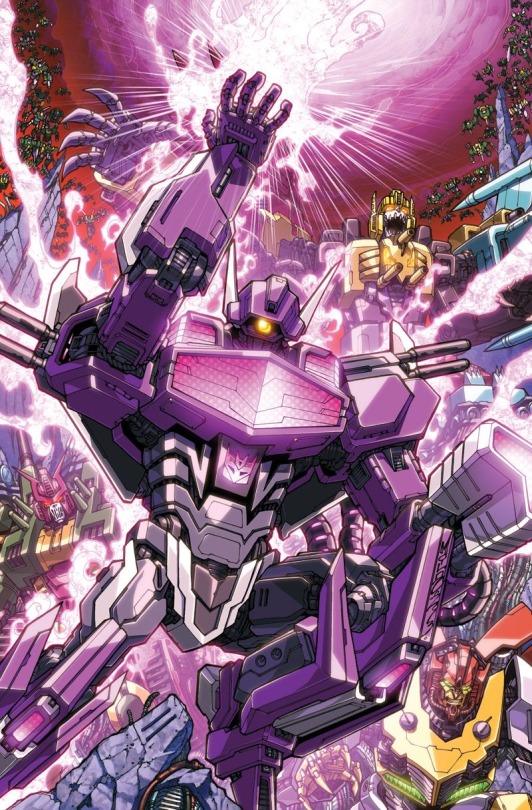

why shockwave is the most fatherly decepticon (even more so than soundwave):
(aka i’m delusional and smitten)
every character in every medium revolves around a theme. a theme in a novel or a show or a film tends to be an idea that will be explored in both the subtext and text of that medium.
shockwave’s theme, surprise, surprise, is creation and rebirth (in most tf media). his whole character is concerned with the parenting of either himself (as a way of rehabilitating after empurata) or of others (predacons, his little bots in cyberverse, or even his subordinates like tarn)
now, you might ask, what sets shockwave’s fatherliness apart from soundwave’s? how is he any more fatherly than soundwave?
allow me to demonstrate with the following screenshot from guardians of the galaxy:
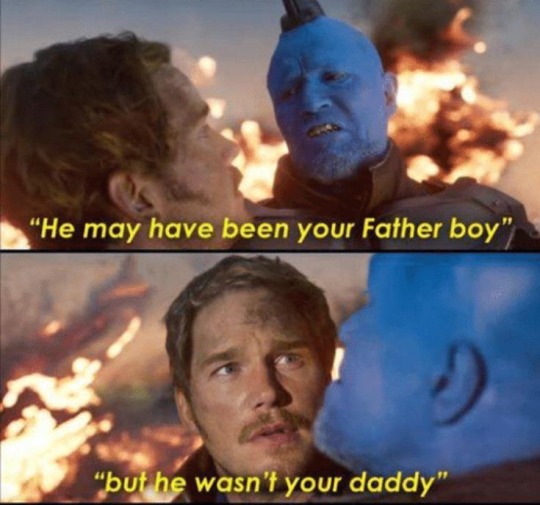
yup.
shockwave was everyone’s father, but soundwave was everyone’s daddy (no not like that)
still not convinced? allow me to introduce you or remind you of the concept of nature vs. nurture. ironically enough, for someone who is only a father, shockwave is the more nurturing one. soundwave is considered a father because he is a cassette player and his “children” are cassettes
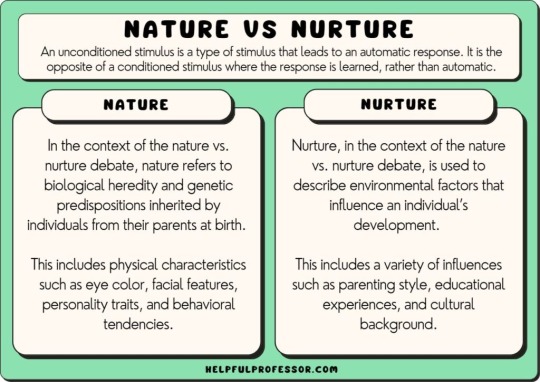
in idw1 soundwave was actually more so adopted by his cassettes rather than the other way around. shockwave, on the other hand, birthed - even if not literally - and raised all the subjects he needed to raise to prepare for either war or for life
in idw1, shockwave was like a father to tarn. post-empurata, he still chose to call tarn the name that defined him the most: “damus.” not “glitch”, not “tarn”, which are all personas and not real identities (glitch = associated with his outlier power, tarn = leader of djd) but “damus.” shockwave knows the real tarn because he was there to raise him.
(extra note: to really drill in the fact that shockwave was fatherly to tarn, shockwave thinks “damus” is tarn’s real name while megatron, right before killing him, implies that “glitch” is. megatron is a military leader; he will favor the identity that holds the most militant potential. shockwave cared for tarn; he will favor the boy he knew when he was still in the academy)
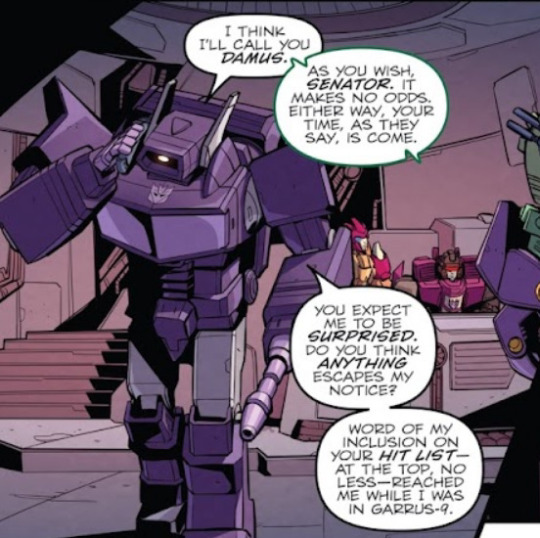
we can even still see the effects of pre-empurata shockwave on tarn, who takes great pleasure in the arts and everything conceptually and fundamentally beautiful like poetry or literature or music. and guess who wanted to be remembered for “both his brains and his beauty”?

in cyberverse, he was actually kinda like a father to shadowstriker. he took her in after she was severely injured and placed her in his unit as a form as rehab, if you will (she wouldn’t have been able to go to more militant and armed units in such a condition). though he was less there to nurture shadowstriker, as she was already a developed adult, he was there to protect her. iirc, in a scene where they get frozen by this immobilizer, shockwave pushes her behind him.
it’s the same in tfp, where shockwave, near the end of the series, shoves ratchet behind him during the spacebridge battle and fires at other autobots. the enemy is LITERALLY next to him and yet he chooses to protect ratchet from stray bullets. and to address the predacon elephant in the room, he literally raised predacons. he petted them and comforted them and gave them sustenance to live and thrive.
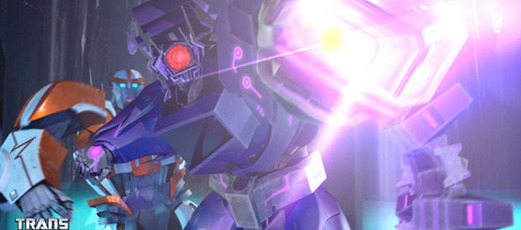
shockwave is cold, rational, and is obsessed with logic, yes, but he assumes this logic from what he has observed and what he has experienced before, whether that before be pre-empurata or before the war.
could he have had a fatherly and caring figure before the war? possibly. could he have picked it up from how animals assume this role automatically, as if it was biologically and universally a logical thing to do? possibly. but have we ever considered that… it’s just part of his personality?
BuT but shoCkwAve dOesnT have EmoTions
if he didn’t have emotions and therefore no personality, he’d never feel compelled to lie or have any will to do anything. he is driven. a computer is not. a computer is told to do something and will output the most logical output based on its coding. he’s self-driven and autonomous with his decisions.
so, to sum it up, shockwave is nurturing, but because he is often overruled by the need to follow a strict diet of reason and self-motivated curiosity for knowledge, this part of him is always overshadowed. he’s not a good man. he will frankly never be. but he can be a good father if he only let himself be. thank you for coming to my ted talk
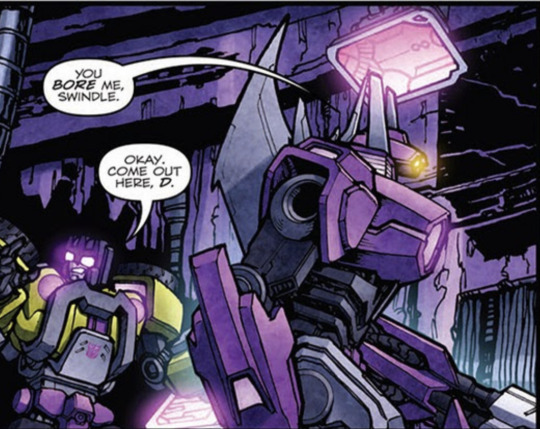
#transformers#transformers idw#maccadam#mtmte#shockwave#senator shockwave#tf idw1#tfp#transformers prime#cyberverse#tf cyberverse#character analysis#i wrote this without glasses#i love him so much#please don’t come for my ass if it’s ooc
131 notes
·
View notes
Text
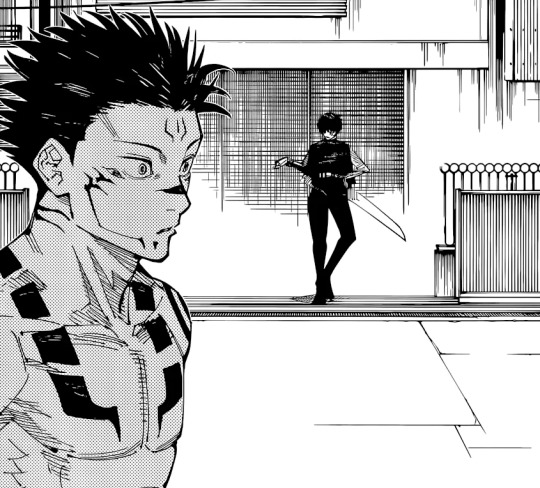
Maki Zen'in vs. Ryomen Sukuna
The past two weeks Maki has faced off against Sukuna. While it seems that Maki and Sukuna's face-off has followed the traditional formula of every individual Sukuna has squared up against so far. That being Sukuna fights them trying to bring out their best, praises them before swiftly defeating them. It's followed the formula so far, with Gojo, Kashimo, Higuruma, and Yuta. Yuta surveys their "taste" as unique sorcerers, and then quickly consumes them.
However, I am going to argue that there's a reason Sukuna takes a special interest in Maki that differs from Gojo Kashimo, Higuruma and Yuta and it's because the two of them foil each other.
1. Skin and Blood, Bone and Marrow
To badly quote Kant, and Johane Fichte thesis and anti-thesis are both necessary in order to make a statement.
Immanuel Kant's Critique of Pure Reason (1781) created the thesis / antithesis dyad, within two statements.
Thesis: "The world had a beginning in time, and is limited in regars to space."
Antithesis: "The world has no beginning and no limits in space, but is infinite, in respect to both time and space."
Fichte turned this dyad into a triad. A set of two contradictory ideas that is resolved with a third statement, synthesis. In order to make of synthesize a new idea, thesis and anti-thesis must meet first.
Are synthetic judgements a priori (before / precending) possible?
No synthesis is possible without a preceding anti-thesis . As little as antithesis without synthesis, or synthesis without anti-thesis, is possible; just as both cannot be born without thesis.
In other words no idea cannot exist without the opposite idea, and no new statements / judgement can be made without exploring these two ideas in opposition to one another.
I spent so much time explaining this philosophical concept because fights in Jujutsu Kaisen aren't just excuses for Akutami Gege to add more elaborate rules to the power system, and give the power-scaling bros more material to argue about. They are a clash of ideals between the two characters fighting, oftentimes with both characters embodying opposite philosophies. At this point it's not subtext, but literally text, Sukuna calls fights a clash of ideals.

Sukuna is not just fighting to physically conquer Yuji, at this point he wants to win in a clash of ideas to, he wants to disprove the ideals Yuji carries in his heart and all that he represents.
Mahito too, all the way back in Shibuya, called his fight with Yuji a clash of truths, rather than the fight between good and evil that Yuji imagined it to be.
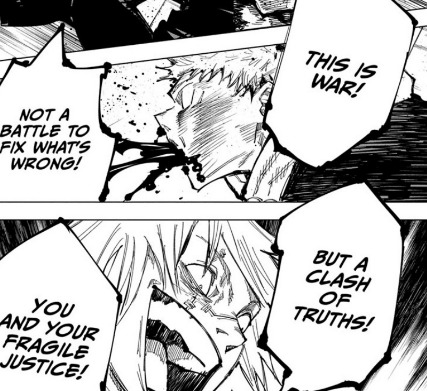
Thesis and Anti-thesis are both necessary to make a statement. Yuji cannot prove his ideals to be true, without clashing with Sukuna first, and the same for Sukuna, Sukuna can no longer disprove Yuji's ideals as false without recognizing his ideals and fighting them head on.
There's a statement on twitter I want to steal that summarizes the matchup of every mini-arc in the Sukuna fighting arc so far.

To summarize Lmfalolawholebunchanumbers point, Mahito and Sukuna acting as antagonists challenge the ideals of the protagonists, but while Mahito represents the reverse of humanity's ideals, Sukuna is against the concept of hodling onto any consistent ideology himself. Sukuna in fact believes that all the ideals of the sorcerers that challenged him in the past were false and flimsy, and is troubled by the fact that Yuji holds onto his ideals no matter what.
I already somewhat explored this in this meta, Sukuna's Anti-Enlightement. Where I argue that Sukuna's ideals resemble nihilism, but even then I wouldn't label Sukuna a nihilist because Nihilism is still a set of beliefs and Sukuna doesn't seem to hold onto any consistent ideology or belief system at all. Trying to assign any human branch of thought or motivation to Sukuna doesn't quite work, because Sukuna's point of view isn't one of a human, but more like an inhuman curse, or even a deity. In other words a calamity.

"Whoever fights monsters should see to it that in the process he does not become a monster. And if you gaze long enough into an abyss, the abyss will gaze back into you.”
Beyond Good and Evil Part IV Frederick Nietzsche
Nietzsche used the abyss as a metaphor to summarize the unknowable psychological complexity of human beings. You stare at the abyss trying to comprehend it. Which means when facing the abyss, the abyss forms in your mind. Anyone who tries to understand humans must face the fact they are incomprehensible. Anyone who tries to create some meaning to life must confront the fact that the world is so ridiculously overcomplicated and random it's impossible for the human mind to fully comprehend.
The abyss as it exists is a place of danger where it's easy to lose sight of your search for meaning, or even yourself, but in order to grow you have to confront the deepest, darkest part
Anyone who tries searching for the truth, risks confronting the idea that they may be wrong, risks questioning their values, risks confronting the fact that what they believed meaningful might have no meaning at all - and therefore the abyss widens inside of them, they might abandon idealism all together.
Anyway, enough boring philosophy more or less every single person who fights Sukuna risks having their ideas feel false. Or to paraphrase the twitter user I quoted above, most of the characters that try projecting their own human ideals onto Sukuna, find not only do they misunderstand Sukuna entirely, but Sukuna doesn't care about their ideals and disproves them.
Gojo and Kashimo (and before them Yorozu) all try to fight Sukuna, believing they could make Sukuna understand them and understand Sukuna in turn only to find they were misreading Sukuna entirely.

Gojo makes a big deal of trying to bring out Sukuna's best to prove that Sukuna is not alone standing on the top, only to be met with Sukuna basically going "I don't really care."

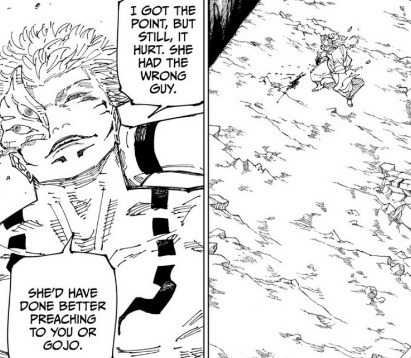
When you confront the abyss, the abyss opens up inside of yourself and your ideas may prove to be false. No one who's faced Sukuna so far, has been able to conquer that abyss, in fact Sukuna keeps rendering their ideals to be false. Perhaps because they are just projecting ideas onto the abyss, looking at Sukuna instead of looking at the abyss inside of themselves.
They want something from Sukuna that Sukuna can't give them, they're looking externally for Sukuna to give them easy answers instead of looking internally. Not one of them is able to form a new idea or make a statement because they're not willing to confront anti-thesis.
The exception to this pattern so far is Maki. There's a reason I've been hammering on about the abyss so much, it's because in this most recent chapter Sukuna calls Maki "a true void."
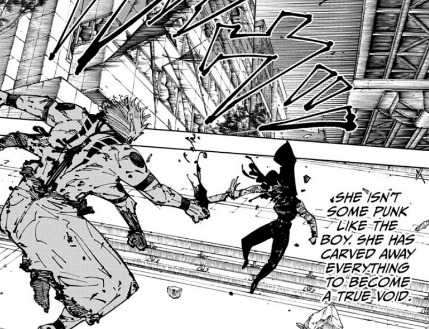
In one sense, there's the technical power system reason why he calls Maki a void. Maki is someone who gave up all cursed energy in order to strengthen her physical body, whereas in comparison Yuji who also mainly fights with his body and super strength, but unlike Maki, Yuji hasn't broken away from cursed energy and is instead soaked in Sukuna's cursed energy.
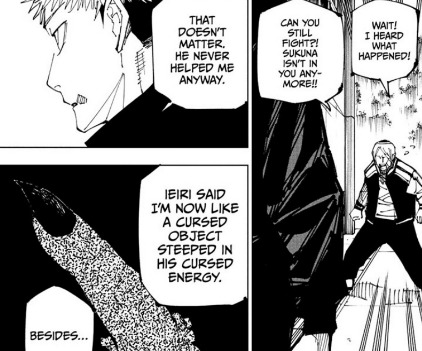
However, not only has Maki cast off cursed energy, unlike Yuji who has suppressed his own identity to become a cog in favor of his ideal of having a role and supporting other people, Maki has let go of the idea of protecting others and instead focused entirely on the idea of improving her own strength.
Though, not entirely by choice as Mai sacrificed herself, but Maki's awakening and becoming of herself happened when she let go of Mai, and protecting Mai or reforming the Zen'in for Mai's sake. Not only did Mai take cursed energy with her when she died allowing Maki to break free of cursed energy, but she also let go of her ideal of protecting Mai. Losing her cursed energy went hand in hand with losing her "goal" and almost immediately afterwards she loses her goal of trying to prove herself to the Zen'in or become clan head and just exterminates them entirely.
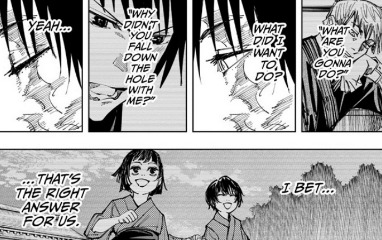
Everything Maki lived for is gone, so what does Maki live for now? Herself mainly, and the concept of total freedom that comes with no longer tying yourself to others.
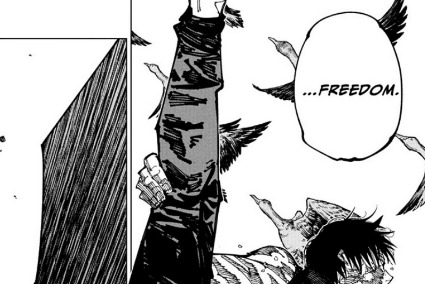
In that way, I'd say that Maki almost resembles Sukuna the most, because if Sukuna represents the void that others must confront Maki is the only character that has opened up the void inside of herself. As Sukuna said unlike Yuji who's half-assed in his idealism, Maki's shaved away everything and is contemplatng the void. Almost to reflect this, Gege's done away with most of Maki's internal narration and most of her internal dialogue is focused on either how to win, and how to bring out the fullest of her abilities.
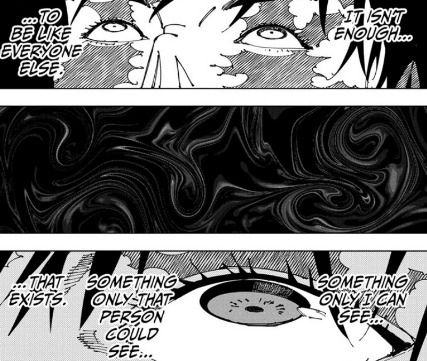
Maki's opened up and contemplated the void inside herself, and in that way she's done away with self-doubt like most of the characters are facing, she's not projecting her anxieties onto Sukuna or wishing for him to answer or resolve her identity crisis like Gojo and Kashimo. She doesn't even have an identity crisis.
In fact, Maki and Sukuna resemble each other so much by both having a void inside of them it makes me wonder if Twin Theory is true that Sukuna also achieved his perfection in Jujutsu by either fusing with his twin in Uterus or cannibalizing his twin somehow.
Even in the fight itself, Maki's the one who's most laser focused on winning, whereas Yuji and Yuta's strategies fail because they're too concerned with saving Megumi who himself at the moment does not wish to be saved. (Saving Megumi is a good thing though, I'm just making a point that Maki much like Sukuna only sees herself winning the fight and prioritizes that above everything else. It's not like she's against saving Megumi either she didn't argue against Yuta and Yuji taking a shot at it). It's just she's the only one who like Sukuna only sees the fight in front of her and doesn't worry about other people. She's laser focused on the win is what I'm saying).
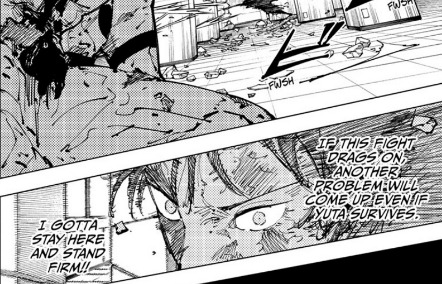
I don't think it's just the fact that Maki has cast away cursed energy that's drawn Sukuna's attention, but the fact that while she represents his anti-thesis focusing on only strengthening the human body, they also share many similarities between them.
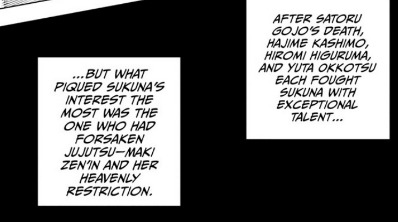
They're both the void.
Sukuna even says that Maki's existence denies Jujutsu itself.
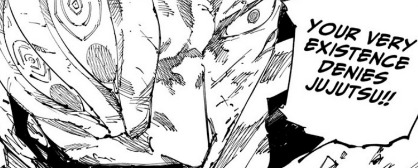
Sukuna says that Maki is the only person who's forced him to have a role, and in a way that's true, because by denying Jujutsu, she represents the void that Sukuna has to contemplate now. In a way she's played an uno-reverse card to Sukuna's philosophy of revolving his entire life around strengthening Jujutsu and being the height of Jujutsu.
Sukuna now has to prove Jujutsu's superiority and contemplate the fact that is ideal might in fact be wrong.
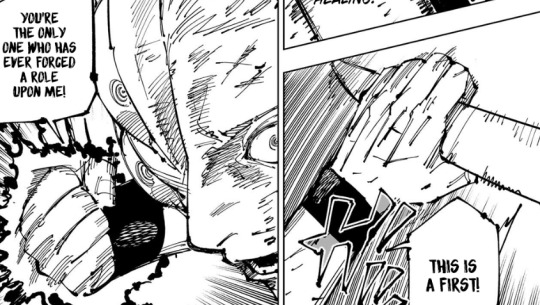
Sukuna and Maki both represent the ideal of what one can achieve in the pursuit of strengthening the body, versus strengthening Jujutsu, Hajime even comments that Sukuna's body is absolute perfection.

Not only that, but they both represent the opposing philosophies established by Kenjaku and Yuki, Kenjaku sees the future evolution of humanity as optimizing cursed energy, and Yuki envisions a future of breaking away from cursed energy entirely and even namedropped Toji and Maki both as examples of those ideals.
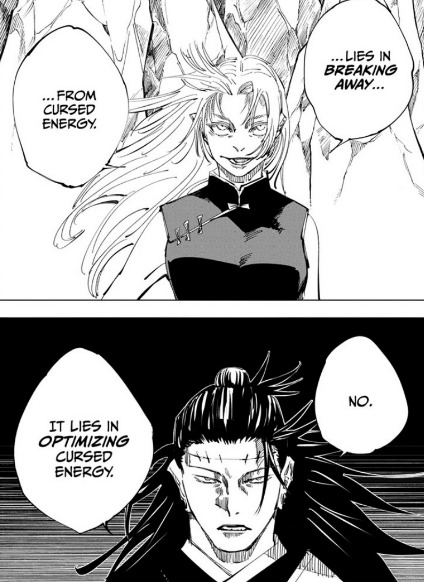
There's a reason that Gojo is troubled by Toji and remembers his loss to Toji years after the fact, Toji deeply troubles Gojo not because he beat him in a fight and caught him off guard but also because his existence challenged everything Gojo believed to be true.
Gojo is the first inheritor of the six-eyes, and Limitless in hundreds of years, he exists solely for Jujutsu as Nanami said, he was also someone who was arrogant at seventeen and was handed everything at birth, who has always been held up on a pedestal by Jujutsu Society. Yet the only person who seriously challenged Gojo and forced him to evolve before Sukuna rolled around was Toji, someone who is the scapegoat of Jujutsu Society, and who is looked down upon by the the three clans. Suddenly, the inherent superiority that Gojo believed in, all the things he thought made him great b/c he was the peak of the Jujutsu world was called into question if a mere monkey could challenge him.

Toji too, stuck around and fought Gojo because he felt a pressing need to disprove the philosophies and ideals that Gojo represented. However, Toji in this fight lost because he succumbed to the void.

He deviated away from his set of ideals and fell prey to his inferiority complex rather than staying true to himself in face of the void.
Gojo's enlightenment itself comes from facing the void that is Toji Zen'in, and then conquering that void by conquering his own biases against Toji that made him let his guard down. Yet, his defeat against Sukuna comes from the fact that he couldn't conquer the void, he couldn't find his own answers instead relying on Sukuna for an answer and because of that Sukuna reduced him back to a human being again with the world cutting slash that cut through the infinity.
In other words in just two chapters Maki vs. Sukuna have embodied a philosophical battle that has been raging in Jujutsu Kaisen since basically Hidden Inventory, and maybe even the beginning of the manga itself and it is what do your ideals, the ideas you live for mean in face of the void / death. Are they worth holding onto, can you create a synthesis from confronting and overcoming your antithesis, or will you too succumb to the meaninglessness that Sukuna represents?
How do you find meaning in a world where death is random, where anyone can die at any moment, a world that is inherently unfair where good things happen to bad people, and selfish monsters like Sukuna get whatever they want who win because they are selfish and step all over people and take what they want.
Confronting Sukuna means confronting the fact that the world may be empty, and we may all be just killing time until we die.

The lines skin and blood, bone and marrow which is what Sukuna uses to refer to the source of is strength (Jujutsu) and the source of Maki's strength (the physical body) are a reference to Bodirahma asking his disciples to understand his teachings.
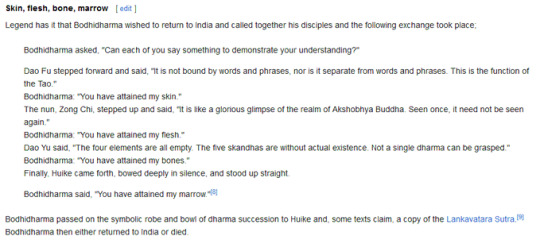
"You have attained my skin. You have attained my flesh. You have attained my bones. You have attained my marrow."
In other words neither Sukuna and Maki are entirely right, the true understanding comes not from Jujutsu, or the Body, but from both, from skin, flesh, bones and marrow.
In other words, a statement requires thesis and anti-thesis. It's not Maki and Sukuna that are right, and something can be learned from the clash of their ideals.
What I'm saying is basically that JUJUTSU KAISEN is a story with THEMES and I love it.
#maki zenin#ryomen sukuna#yuji itadori#satoru gojo#jjk meta#sukuna#maki zen'in#jujutsu kaisen meta#jujutsu kaisen theory
91 notes
·
View notes